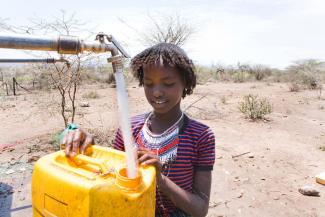Blended finance
Innovative funding models
 Ton Koene/Lineair
Ton Koene/Lineair
Member countries of the Organisation for Economic Co-operation and Development (OECD) are spending less and less of their official development assistance (ODA) on water and sanitation. However, 2.1 billion people still have no access to safe drinking water, and over 4 billion people lack access to toilets.
Actors in the water sector are therefore looking for new and innovative ways to acquire desperately needed funding. The potential of blended finance is being discussed frequently. The approach reduces the risks that private investors run, and thus makes profits more predictable. According to an OECD study, however, less than two percent of blended finance were applied to water and sanitation in recent years.
There are some promising examples, however. One is the Philippine Water Revolving Fund. Local financial institutions pay into the fund, and Philippine water utilities can borrow from it to expand their service network or make other important investments. The financial institutions get guarantees from Philippine government institutions as well as the USAID, the bilateral agency. The guarantees are managed by the Development Bank of the Philippines (DBP). Moreover, JICA, the Japanese agency, is supporting the fund with a concessionary loan. The constellation reduces risks for local financial institutions and thus mobilises additional funding.
Nonetheless, Chris Clubb from the Convergence network says that conventional ODA will still make up the lion’s share of funding devoted to achieving development goals in the water sector in the future. Convergence has about 300 members internationally, and most are from the private sector. The network is funded by the Canadian government.
Funds must not only be made available in sufficient amounts, they must also be used efficiently. Good management is essential, but cannot be taken for granted in the water sector, as Susanne Dorasil of Germany’s Federal Ministry for Economic Cooperation and Development (BMZ) emphasised at a conference organised by GIZ and the OECD in Frankfurt in October. In many developing countries, water utilities are unable to cover their costs, and that makes them unattractive to investors.
William Muhairwe, the former director of Uganda’s national water utility, points out that good governance is essential. A GIZ study has confirmed his view. The point is that the best deals on blending finance are useless if the money is not used responsibly.
The conference spelled out basic policy recommendations. They can help to make better use of blended finance in the future:
- Donors should support the development of national capital markets in order to reduce the dependence of the water sector on foreign-currency financing.
- One focus of ODA should be to improve investment conditions, for instance by strengthening institutions and policy frameworks.
- Development programmes should link capacity development more closely with investment, because an appropriate institutional environment is needed if the expansion of infrastructure is to lead to long-term improvements in water and sanitation services.
- Donors should make more use of guarantees to leverage private-sector investments for development goals.
- Donors, non-governmental organisations and private-sector institutions should share experiences and define best practices.
- Donors and financial institutions should make the allocation of funds more transparent and better track sustainability.
Financing the water sector remains on the agenda of the OECD and the BMZ.
Link
Conference website:
http://www.oecd.org/water/conferenceclosingthefinancinggapforwaterinlinewithsdgambitionstheroleofblendedfinance.htm

